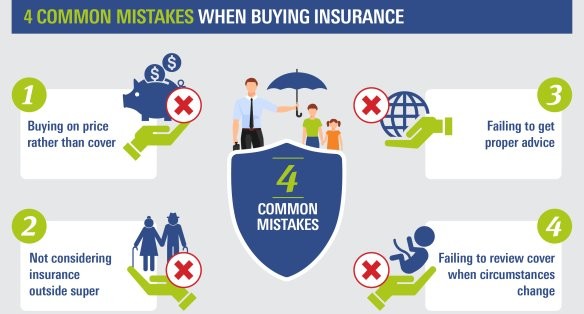Obtaining an insurance policy could be a bit complicated and alienating at times. There could be several possibilities open; hence making a mistake might cost you heavily financially due to the various terms available. However, to enhance prudent paying for it, below are common mistakes shoppers should keep away from when buying them.
- Underestimating The Risks At Stake
People tend to forget about recognizing all their protection needs which lead them into making grievous errors regarding this matter. It is important that we take time before making any purchase or investment decision concerning policies by assessing individual situations’ uniqueness so as to find out if any kind of insurance needs is necessary or not. Among these examinations are:
Risk Evaluation: Determine the key areas where you are most exposed or have concerns as regards risks. For instance, if as a homeowner one wants security against damage on property then homeowners’ coverage shall suffice; but if dependents do exist then life assurance will go further in ensuring financial stability in the long run
Evaluating Cost Impacts: Consider how bad things could affect you personally and monetary wise when they happen thus ensuring the protection limits cover possible losses or expenses that may arise because of certain happenings.
Inadequate understanding between what ones actual needs calls for and how much premium one pays results into underinsurance or payment for unneeded cover.
- Selecting the Buy-at-All-Costs Insurance Without Evaluating its Quality
Tempting as it may seem, a decision to opt for cheapest insurance policy can lead into expensive errors. However, one needs to consider other things apart from price. Here is the reason;
Coverage Limits: Cheaper policies may have lower coverage limits or higher deductibles which may expose you to large out-of-pocket expenses.
Exclusions: Budget policies may come certain exclusions or limitations that are not immediately obvious make sure that you know what is covered and what is not.
Customer Service: Cheap providers might provide poor customer service or use long claim processing times hence becoming problematic in case of need for support.
It is always important to weigh cost against quality in terms of coverage and customer service to ensure maximum satisfaction.
- On policy details and fine print that fail to be paid attention to
Insurance policies are often filled with complex terms and conditions. If you ignore these, you may end up confused during time of making claims. Here common problems:
Exclusions: there are particular exclusions or limitations in many policies know what is not included.
Deductibles and Copayments: consider how much you will have to pay before getting insurance cover.
Renewal Terms: look at terms for renewing the policy including possible rise in premiums or amendments in coverage.
Asking questions about unclear points is a way of avoiding shocks later even if it involves going through the policy papers thoroughly.
- Ignoring Multiple Quotes for Comparison
Another blunder is neglecting to contrast quotes from varying insurance companies. Rates may diverge enormously across firms while collecting a number of estimates can aid in acquiring the most favorable deal. When contrasting estimates, think about:
Discrepancy in Coverage: Ensure that you are comparing the same level of coverage and policy attributes.
Discounts: Various providers may have different discounts which affect the total price differently.
The effort spent on shopping should aid in finding a plan that adequately protects at an affordable price.
- Ignoring Policy Review and Update on Regular Basis
Your insurance requirements might evolve over time because of various life occurrences like matrimony, childbearing, homeownership or business establishment. Un updated policy might not give you sufficient protection if it is not evaluated at appropriate times. Regularly reviewing your policies guarantees that:
Coverage is Adequate: Modify the coverage limits as per requirement changes in your asset list.
Policy Terms are Current: Check if still relevant, the contract conditions align with this stage of life.
Setting an annual reminder to review your insurance policies or after major life events can keep you on top of necessary updates.
- Confusing the Claims Process
When the need arises, understanding the complexity of a claims process can lead to better use of your insurance coverage. Common errors here are:
Not Knowing How to File a Claim: Understand the steps to be followed when filing a claim including documents needed and time limits.
Delaying Claims: Claims are sometimes time-barred as specified in the policy document, therefore delays could lead to rejection or lower payments.
Furthermore, by learning about claims processes and keeping records regarding your dealings with insurers can help prevent hitches during times of making claims.
- Not Asking Questions as a Key Mistake.
The intricacies involved in insurance policies make it necessary for you to ask questions if unsure about any policies’ aspect. Usually asked questions would include:
What is included and what is not?
How does making claims work?
Are there discounts or specials attached?
Don’t feel shy at all about contacting an insurance agent or broker for clarification. They can offer crucial advice and steer you toward making proper choices.
- Not Asking Questions as a Key Mistake.
The intricacies involved in insurance policies make it necessary for you to ask questions if unsure about any policies’ aspect. Usually asked questions would include:
What is included and what is not?
How does making claims work?
Are there discounts or specials attached?
Don’t feel shy at all about contacting an insurance agent or broker for clarification. They can offer crucial advice and steer you toward making proper choices.
- Lack of Consideration for Extra Coverage Options
Your basic policies might fail to provide you with the necessary cover: However additional coverage options should not be ignored otherwise you’re taking risks without knowing. Consider:
Endorsements/Riders: A few items can be created under these which may fit perfectly well into what one wants e.g., valuable personal property in home insurance.
Umbrella Policies: These are meant for more liability above the main policies hence can be used as a safe net when huge claims come up.
You can achieve a well-rounded insurance by looking at some more policies.
10. Not Grasping the Importance of Deductibles and Premiums
In selecting appropriate insurance, it is necessary to consider the correlation between deductibles and premiums. Usually if the deduction is high then the premium becomes low but this has its own price since there will be extra costs when claiming loss from it. On the other hand, if deductions are low premiums become higher.
When making your choice, evaluate whether you can pay more and be comfortable with higher monthly installments or vice versa. Finding a balance between these two aspects is important since they affect monthly plans as well as potential expenditures.
11. Leaving out other premiums
Some of your needs may not be met by a simple insurance policy. Underestimating extra coverages exposes you to various risks. Consider:
Optional Riders or Endorsements: These provide tailored extra coverages like including valuable personal property in homeowners’ insurance.
Umbrella Policies: This provides more liability than your basic policies and thus offers more selection against financial disaster in case of huge claims.
Considering additional coverages enables you have comprehensive safety for all risks.



